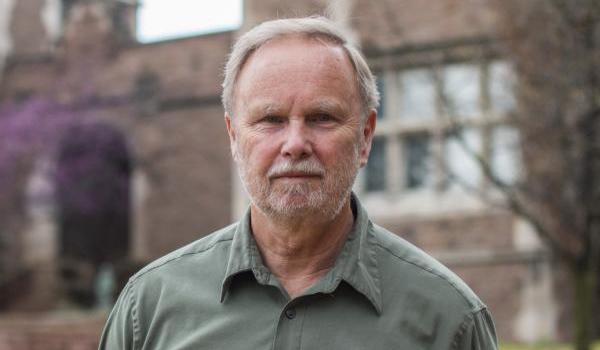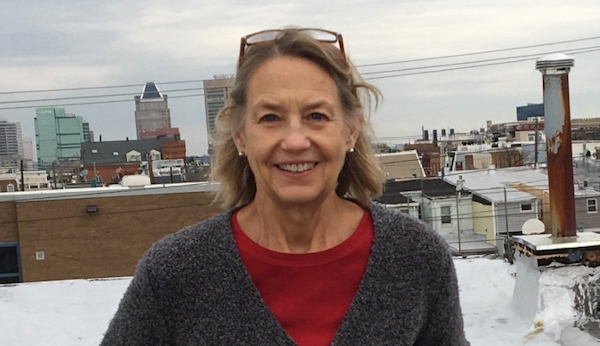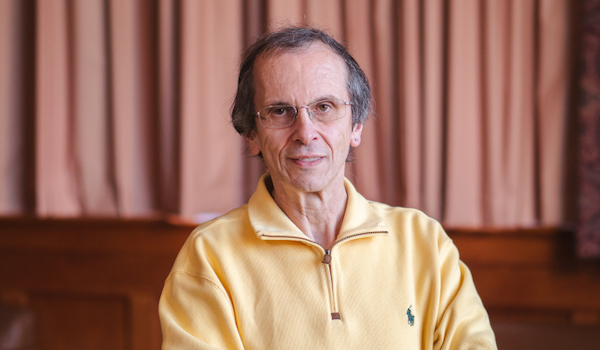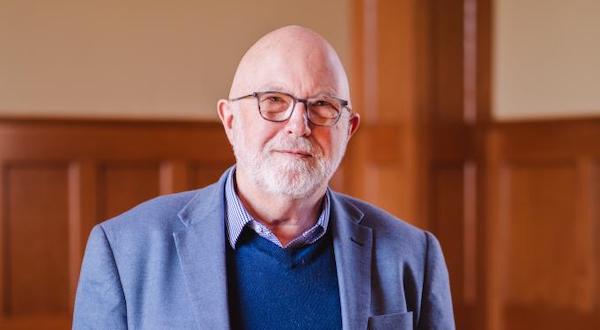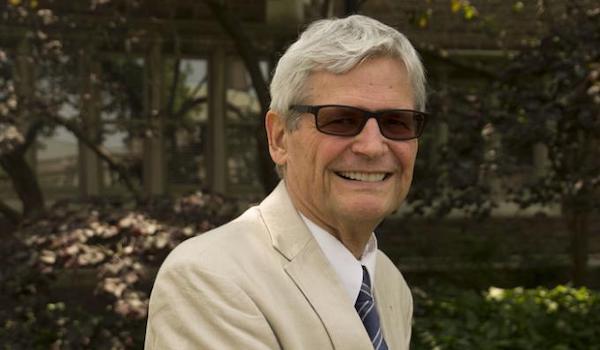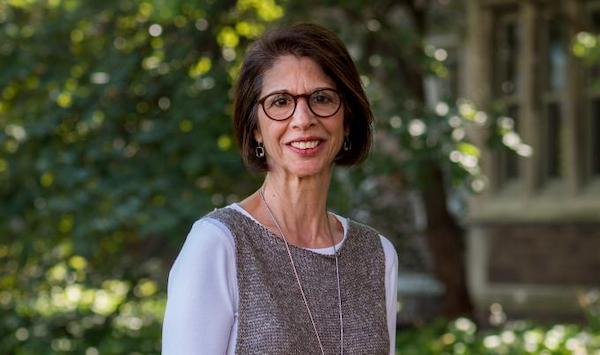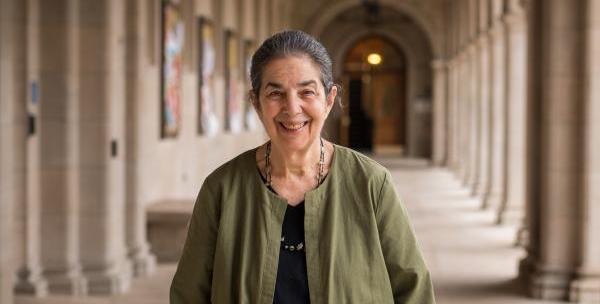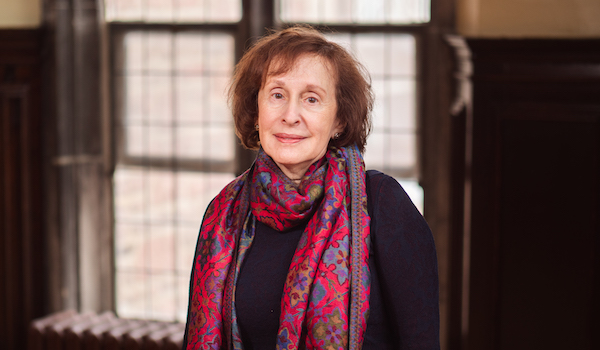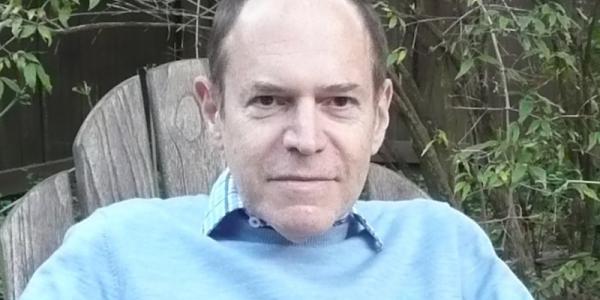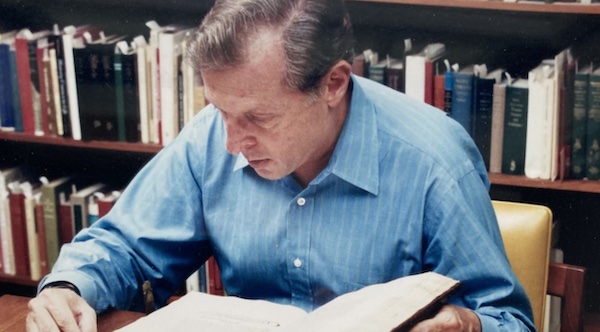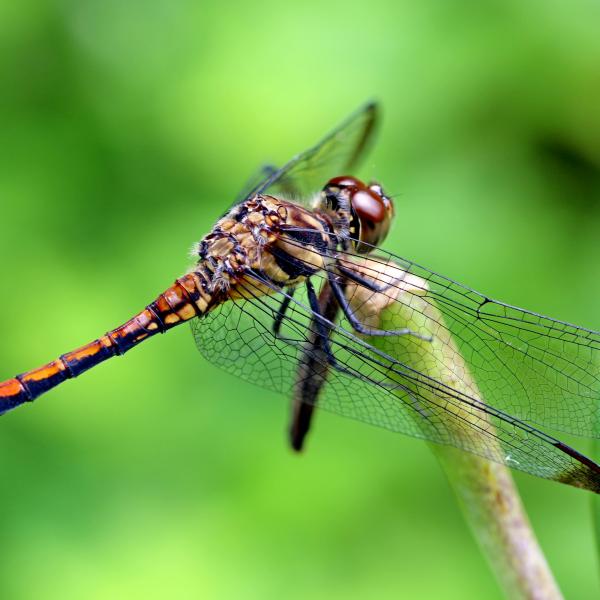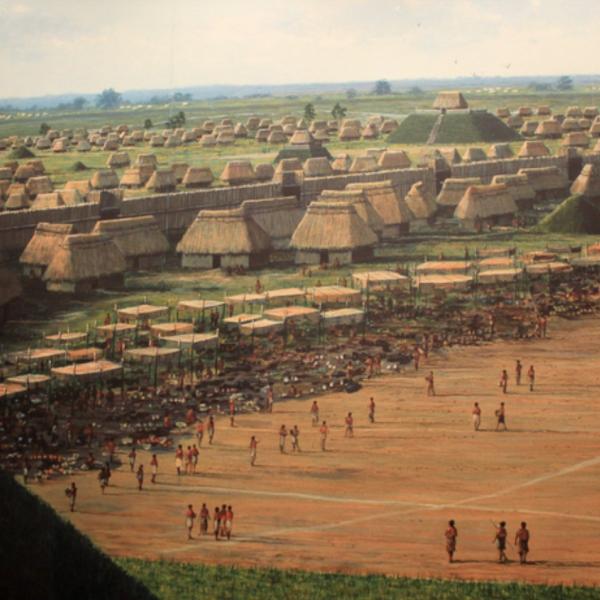Join us in recognizing the achievements and memories of faculty members who are closing out their careers in Arts & Sciences.
Raymond E. Arvidson
Department of Earth and Planetary Sciences
Raymond E. Arvidson, the James S. McDonnell Distinguished University Professor, grew up watching the United States race the Soviet Union to the moon. Arvidson’s early impressions of space exploration set the stage for his distinguished career, which has spanned nearly 50 years; encompassed numerous NASA missions, including almost every mission to Mars since the mid-1970s; and impacted countless students, many of whom are now themselves leaders in the field of planetary science.
“I was lucky to get involved in NASA’s planetary exploration program, just as it was being born,” Arvidson recalled. “I got to see the whole NASA solar system exploration program blossom, starting as a science team member for the Viking lander mission with Carl Sagan in 1976.” Following that experience, Arvidson went on to work on the Magellan mission to Venus and many missions to the red planet.
Arvidson has also devoted considerable energy to teaching and outreach. To meet the needs of students seeking more field research opportunities, he designed and led the Pathfinder Program for undergraduates, which has taken Arvidson and his students to exotic locales from Hawaii to the Spanish Rio Tinto to the Mojave Desert. “I always wound up with a group of students who were academically absolutely outstanding,” Arvidson said.
After his official retirement this summer, Arvidson plans to continue his involvement with NASA’s Mars Science Laboratory’s Curiosity rover, as well as his work with the Planetary Data System (PDS). Beyond his projects with NASA, Arvidson will also continue as resident astronomer for Viking Ocean Cruises.
Read more about Arvidson's career.
Mary Ann Dzuback
Department of Women, Gender, and Sexuality Studies
When Mary Ann Dzuback joined the faculty in 1987 as a historian of education, she noticed a troubling reality. Very few women at Washington University were associate or full professors; Dzuback herself was only the second woman to gain tenure in the Department of Education.
“A number of us were alarmed that so few women were being promoted, so we started holding brown bag lunches to talk about the climate issues for women,” Dzuback recalled. “At some point a few of us decided that we had enough information to try to make change.” The group went on to form the Association of Women Faculty (AWF), an organization that since 1995 has successfully pushed for family responsive policies, equal pay initiatives, the hiring of a new vice provost for faculty development, and more.
As a researcher in the Department of Women, Gender, and Sexuality Studies, Dzuback studied historical women scholars like sociologist Amy Hewes, who in 1912 advocated for passage of a minimum wage law in Massachusetts. As a teacher, Dzuback provided her students with tools to likewise create knowledge and drive change. One of her favorite courses to teach, “Feminist Research Methodologies,” resulted in a number of undergraduate honors theses and dissertation proposals.
In retirement, Dzuback looks forward to completing her book on women scholars, traveling, and keeping up with former students and collaborators.
Pascal Ifri
Department of Romance Languages and Literatures
If Pascal Ifri, professor of French, could have everyone at Washington University read one novel, it would be In Search of Lost Time by Marcel Proust. Over the course of seven volumes, the novel’s narrator recounts memories from his life in late 19th- and early-20th-century France. As Ifri enters retirement, he also finds himself looking back – in his case, at a 40-year career in the Department of Romance Languages and Literatures.
In addition to researching and writing about 20th-century French novels, Ifri enjoyed teaching language and literature courses and, in the 1980s, overseeing a yearlong study abroad program housed at his alma mater in Normandy, France. His favorite course to teach, “French Culture and Civilization,” allowed him to observe in real time the cultural shifts happening over the decades.
“In forty years, I have been able to show how much France and its population have evolved,” Ifri remembered. “It was also the first course that allowed me to use technology in class. I was using a special classroom in which I could show French TV news that I had recorded at home on a VHS tape.”
Ifri plans to continue his scholarship in retirement. He looks forward to being able to travel year-round, but he will miss his students. “It was a real pleasure to teach them,” Ifri said. “They are not only hard-working and serious, but typically personable and interesting.”
David Lawton
Department of English
David Lawton, now professor emeritus of English, has published widely in English literary and cultural studies and in medieval studies. In 2019 he released both The Norton Chaucer and the Norton edition of “The Canterbury Tales,” and two years earlier he published a book on voice in medieval literature.
Lawton first joined the Washington University faculty in 1998, and he chaired the Department of English from 2002–08. He found it a “privilege and a pleasure” to work with WashU students, and he particularly enjoyed teaching regular courses on Chaucer and the Bible as literature. Lawton served as main advisor on more than 20 doctoral dissertations and has received awards for excellence in mentoring and teaching. “My special course was a senior honors seminar called 'The Body in Pain,' in which we swam against the current of the students' degree by placing the personal at the very core of their (and my) education,” he said.
Lawton served for a decade as executive director of the New Chaucer Society and for 20 years as co-editor of New Medieval Literature, a major journal that he founded. He has also published poetry and journalism, and appeared on radio and television, in the U.S., Britain, and Australia. He now resides primarily in Normandy, France, and he has taken up a part-time professorship at Durham University.
Paul Michael Lützeler
Department of Germanic Languages and Literatures
After nearly 50 years on the Washington University faculty, Paul Michael Lützeler, the Rosa May Distinguished University Professor in the Humanities, views the university as “a place of great hospitality.” This hospitality allowed Lützeler to organize numerous international symposia, found four graduate exchange programs with German universities, and develop strong, lasting connections with scholars around the world.
In 1985, with support from the Max Kade Foundation in New York and several European organizations, Lützeler founded the Max Kade Center for Contemporary German Literature. The center continues to invite German critics and authors to teach on campus, organize international symposia, support graduate work through summer grants, publish a yearly German Studies yearbook, and more.
In addition to serving as the Max Kade Center’s longtime director, Lützeler has worked closely with students over the decades. He served as dissertation director for 53 doctoral candidates. These students had the benefit of a special collection at Olin library, founded through the Max Kade Center, that now bears Lützeler’s name.
"I loved the spirit of cutting-edge research at Washington University, and over the years I was able to publish a good number of books and editions in my fields of expertise," Lutzeler said. In retirement, he will continue to research, publish, and travel. He also looks forward to keeping in touch with former students and colleagues.
Ginger Marcus
Department of East Asian Languages and Cultures
When Ginger Marcus, professor of practice of Japanese language, began teaching at Washington University in 1986, her office had no technology — not even a phone. Since then, Marcus’s home department has changed names multiple times, the campus has gradually taken on a “park-like” appearance, and student admission has become increasingly selective.
“There are many more international students in my classes,” she said, “and I would say that all WashU students are very hard-working, motivated, ambitious, and smart.”
One constant over 35 years has been Marcus’s love of teaching. “My favorite course to teach has always been the 1st-Level Modern Japanese course,” she said. “It attracts the most students, and it is the course that can have the most impact on a student’s academic and professional life.” She also deeply enjoys guiding advanced students as they gain proficiency and confidence over four years.
In 2020–21, Marcus brought her expertise to the national stage with the publication of the 8-book series and website NihonGO NOW!, coauthored with four colleagues from across the U.S. “The series represents the culmination of my long career teaching Japanese and was an absolute pleasure to work on,” Marcus said. “I hope it has an impact on the next generation of language teachers and learners.”
Vivian Pollak
Department of English
Back in 1995, while in the middle of teaching a graduate seminar during her first semester at Washington University in St. Louis, Vivian Pollak heard an unfamiliar wail. Now professor emerita of English, Pollak recalls that she “continued teaching blithely on until one of the students said, ‘Professor Pollak. Those are tornado sirens. Do you think we should go into the basement?’” Huddling with students in the basement – waiting for an all-clear that never came – remains a memorable moment from Pollak’s more than 25 years in Arts & Sciences.
As a scholar of 19th- and 20th- century American literature, Pollak has published widely on Emily Dickinson, Walt Whitman, Henry James, and others. Her most recent book is Our Emily Dickinsons: American Women Poets and the Intimacies of Difference. For those at WashU unfamiliar with Dickinson, she recommends reading “’Hope’ is the thing with feathers,” a poem she describes as accessible, “yet mysterious enough to make us curious about the person and how she came to write the poem.”
Alongside her research, Pollak deeply enjoyed teaching courses on Whitman and Dickinson – especially when classes allowed for face-to-face time with students. “I was amazingly happy when we were able to return to in-person classes. Zoom has its charms but it’s not the same,” Pollak said. In retirement, she looks forward to having more time to do some of her favorite things, including traveling, exercising, sleeping, reading, and writing.
Carolyn Sargent
Department of Anthropology
Carolyn Sargent’s career as a medical anthropologist has taken her around the world, including a six-year stint in the Republic of Benin and projects in West Africa, Jamaica, and France. In all these locations, she studied how structural inequalities produce health disparities, particularly for women. Recently, she had the “rewarding and difficult” experience of working in Paris with Muslim West African immigrants in treatment for cancer.
When not conducting fieldwork, Sargent enjoyed sharing her expertise with students. She was particularly fond of working with seniors working on honors theses and, as a former Marshall scholar, serving on committees to evaluate candidates for Rhodes and Marshall scholarships. For ten years, she also codirected a summer program in France.
“I have been excited to see the growth of our global health and environment concentration, biological anthropology, and science and technology studies,” said Sargent. “We have a large, growing, and diverse population of students drawn to these fields and attracted to anthropology.”
Sargent has valued cross-disciplinary opportunities and connections in both her research and teaching. In a favorite foundational lecture course for global health, she helped students understand “how social sciences and humanities can be valuable areas of knowledge for students planning a career in the sciences and medicine.” Her own work included collaborations with Brown School faculty.
As Sargent closes out her time as a faculty member, she looks forward to time with family and completing an ongoing scholarly project.
Gary Wihl
Department of English
Gary Wihl, the Hortense & Tobias Lewin Distinguished Professor in the Humanities, joined the Washington University faculty in 2009. Wihl is a respected scholar of 19th- and 20th-century English and American literature. He wrote two monographs in that field, Ruskin and the Rhetoric of Infallibility (1985) and The Contingency of Theory: Pragmatism, Expressivism, and Deconstruction (1994).
From 2009–12, Wihl served as dean of the faculty of Arts & Sciences. As dean, Wihl led Arts & Sciences through many administrative and leadership changes, including the recruitment of the dean of the College of Arts & Sciences and of the director of the John C. Danforth Center on Religion & Politics. He also led the redevelopment of Umrath and Cupples II halls. Before coming to WashU, Wihl was dean of the humanities at Rice University.
Steven Zwicker
Department of English
Steven Zwicker, the Stanley Elkin Professor in the Humanities, became professor emeritus of English on January 1, 2022. “WashU has been the perfect institution for my teaching and writing — wonderfully supportive and with terrific students,” Zwicker recalled when reflecting on his career at WashU, which began in 1969.
“Of course the department has changed personnel almost completely since that time and the university has put up many new buildings over the last half century, but I also sense quite a bit of continuity in the values of teaching and research that were very much in evidence in 1969,” Zwicker said. There will also be continuity between Zwicker’s activities on the faculty and his post-retirement plans, as he plans to now do “more of the same: reading and writing.”
Zwicker specialized in 17th-century literature, and he took pleasure in introducing both undergraduate and graduate students to the writings of Ben Jonson, John Milton, Andrew Marvell, and John Dryden. He also enjoyed long-term teaching collaborations with colleagues in the Department of History, including Derek Hirst and Gerry Izenberg. “At the graduate level, in seminar, I've been able to work with students as colleagues, and that sense of study as collaboration has been very gratifying,” he said.
